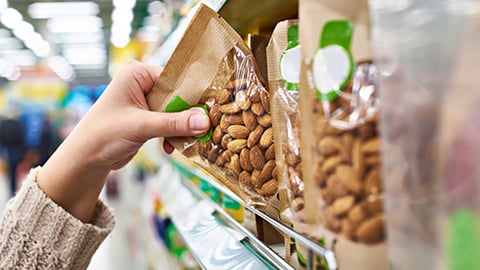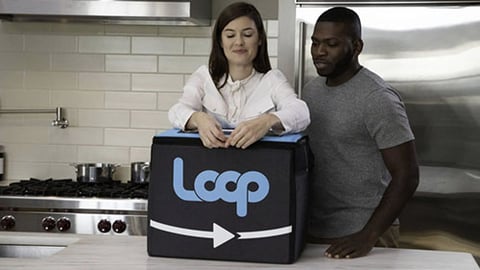5 Ways Grocers Can Address Toxic Chemicals in Food Packaging
A new trend is sweeping across grocery aisles nationwide. Consumers are growing increasingly concerned about toxic chemicals in food. The market has shifted away from products containing bisphenol A (BPA) — previously found in baby bottles and canned foods. Many of the nation’s largest grocers , such as Kroger and Albertsons, have reported notable progress in reducing BPA in their private brands.
But BPA is not the only chemical in the food supply that should be on the radar of grocery chains. Meet the new BPA: PFAS and phthalates.
Scientists are sounding the alarm on per- and polyfluoroalkyl substances (PFAS), which have contaminated the drinking water of millions of Americans, with some linked to cancer and liver disease.
Yet grocers may not realize that the greatest exposure to PFAS and another class of chemicals, phthalates, comes from our food. Phthalates and PFAS may be present in materials used in food processing, packaging and preparation. These chemicals pose significant hidden financial, legal, regulatory and reputational liabilities to businesses that are not properly managing the risks.
Are Toxic PFAS in the Grocery Aisle?
The Mind the Store campaign recently put packaging from popular grocery stores to the test. We and Toxic-Free Future investigated where PFAS chemicals may be found at top chains in our report “Take out Toxics.” Nearly two-thirds (five out of eight) of the paper takeout containers tested contained elevated levels of fluorine. This indicates that they were likely treated with PFAS. Eleven percent (four out of 38) of bakery and deli papers tested were also likely treated with PFAS. More recent testing has identified the likely presence of PFAS in microwavable popcorn packaging.
Grocery Chains Beginning to Act
Major grocery retailers and the government are beginning to respond. Last December, both Whole Foods and Trader Joe’s pledged action on PFAS. The European chain COOP has eliminated PFAS in microwavable popcorn packaging. Governments around the country, such as the states of Washington and Maine, have started to phase out PFAS in food packaging. Similar federal legislation was also introduced last month.
Phthalates Still Used
Scientists have expressed concern about phthalates for decades. In 2014, an expert science panel concluded that 5 to 10 percent of pregnant women and infants face an unacceptable cumulative risk of reproductive harm from five phthalates, mostly from food.
The market has been shifting to safer alternatives. For example, phthalates are no longer used in clingwrap film used to wrap food. However, phthalates are still used in plastic tubing and food conveyor belts in processing. In packaging, phthalates are still used in printing inks, adhesives, and vinyl cap gaskets of jar lids and bottle caps. Vinyl gloves, commonly used in grocery delis, still contain phthalates, and any vinyl glove may contain phthalates due to poor supply-chain management.
Leading brands have already established best practices. Nestlé prohibits the use of phthalates in its food packaging. The Institute of Packaging Professionals recommends similar action to address phthalates. Grocery chains can ensure that their private label jars and bottles use only non-phthalate gaskets and replace any vinyl foodservice gloves with safer ones.
A Road Map for Grocery Businesses
Grocers that get out in front of these challenges can differentiate themselves from competitors and build trust with customers. For businesses up and down the value chain, this trend unleashes new opportunities for innovation and business development by suppliers of reformulated products and packaging.
To begin the journey to safer food free of these hazardous chemicals, grocery retailers can take these steps:
1. Policy: Publish a written chemicals policy, ensuring engagement by senior management and the board of directors, and accountability for suppliers, that measures and reports on progress toward eliminating and replacing toxic chemicals with safer alternatives.
2. PFAS and phthalates: Prioritize the elimination of PFAS and phthalates in food-contact materials, food and other products. For PFAS, start with private brands and foodservice ware items such as takeout containers and microwavable popcorn. For phthalates, start with vinyl gloves used in delis, and private label jars and bottles. Over time, expand to other categories and brand-name products.
3. Goals and metrics: Set public goals with timelines and metrics to measure progress in eliminating toxic chemicals .
4. Transparency: Meet the rising consumer demand for full public disclosure of chemical ingredients in products and packaging, public safer-chemicals policies, and disclosure of progress and challenges in eliminating harmful chemicals.
5. Avoid regrettable substitution: Evaluate the hazards of alternatives to ensure that the substitutes are safer using tools such as the GreenScreen.
These recommendations are included in our annual Retailer Report Card that grades grocery chains on their chemicals policies.
Our suggestions can help grocery chains sell more sustainable products, enhance their reputations with customers and other stakeholders, differentiate themselves from competitors, and mitigate risks. That’s a win-win that every grocery chain should get behind.







